The Anti-Tesla: Why Toyota Remains Hung Up On Hydrogen

Toyota Mirai. Photo by Kyle Field/CleanTechnica.
 CARS
CARS
ByGuest Contributor
Published 3 days ago
Originally posted on EVANNEX.
By Charles Morris
Toyota didn’t rise to the pinnacle of the global auto industry by chance. Throughout its history, it’s been an extremely innovative, forward-looking company. Books have been written, and college courses taught, about its engineering excellence. That’s why the company’s vaunted revamp of its Mirai fuel cell–powered sedan has so many auto industry observers scratching their heads. Why does such an advanced company continue to insist that fuel cells are a viable technology for passenger cars, an application that most other automakers have abandoned?
Michael Barnard, writing in Medium, calls Toyota’s obsession with fuel cell–powered cars “bizarre,” but he explains that what most of us now see as the company’s bad bet on the hydrogen-powered Mirai sedan is a more nuanced issue than it might appear from today’s perspective.
ByGuest Contributor
Published 3 days ago
Originally posted on EVANNEX.
By Charles Morris
Toyota didn’t rise to the pinnacle of the global auto industry by chance. Throughout its history, it’s been an extremely innovative, forward-looking company. Books have been written, and college courses taught, about its engineering excellence. That’s why the company’s vaunted revamp of its Mirai fuel cell–powered sedan has so many auto industry observers scratching their heads. Why does such an advanced company continue to insist that fuel cells are a viable technology for passenger cars, an application that most other automakers have abandoned?
Michael Barnard, writing in Medium, calls Toyota’s obsession with fuel cell–powered cars “bizarre,” but he explains that what most of us now see as the company’s bad bet on the hydrogen-powered Mirai sedan is a more nuanced issue than it might appear from today’s perspective.
When Toyota first began investing in hydrogen in 1992, it was actually a forward-thinking move. At the time, few would have guessed that lithium-ion batteries would evolve as quickly as they have. The original Tesla Roadster was 16 years in the future.
“Betting on hydrogen drive trains in 1992 was incredibly reasonable,” Barnard writes, and notes that Toyota was also exploring battery-electric vehicles at the time — it delivered its first electric car in 1993. Experimenting with both these varieties of EV was an innovation of the kind Toyota was known for.
Even into the 2000s, it was possible to look at hydrogen and battery-electric powertrains and believe that the former would eventually win the race. However, “it became clear by 2010, and crystal clear by 2013, that the fuel cell category was a serious dead end,” Barnard writes. He cites the work of an engineer named Emile Nijssen (posted under the nom de écran “mux”), who did extensive work with fuel cells, and wrote an extremely detailed explanation of why fuel cell cars weren’t practical in 2015.
Be that as it may, Toyota introduced the Mirai in 2014, and has waged an uphill battle to generate interest in it ever since. The Prius hybrid, launched in 2017, has been a spectacular success — to date, Toyota’s hybrids have sold over 10 million units. Meanwhile, the Mirai remains a sort of perpetual R&D project.
In a way, the Mirai is like the “compliance cars” that Toyota and other major automakers produced in the 2010s — it’s sold in low volume in a couple of limited markets, and its maker has never made any serious effort to market it. The difference is that the automakers killed their battery-electric compliance cars after a few years, but Toyota has not only kept the Mirai alive, but even recently released a new and (somewhat) improved model.
“The original bet on hydrogen wasn’t a mistake, but continuing the pursuit past 2010 certainly was,” Barnard writes. “And the Toyota Mirai was a mistake from the beginning until its inevitable end. It’s on life support now, and…eventually, Toyota will pull the plug.” Barnard believes that the Mirai is being kept alive mainly to save face for an older generation of Toyota execs and Japanese government officials.
A look at the present and future hydrogen industry in The Economist delivers a similar conclusion. This article is a well-written and detailed description of the various applications of hydrogen, and it’s a must-read for any who would don their armor and sally forth to do battle in the hydrogen-vs-battery wars.
The Economist points out that hydrogen is vital for certain industrial processes, notably the production of ammonia, the main ingredient in artificial fertilizers, and that the hydrogen used for these purposes needs to come from renewable sources (green hydrogen) rather than from fossil fuels (grey, black, blue and other hues) that are mostly used today.
When it comes to aviation and shipping, reasonable minds disagree about the role of hydrogen. Several companies, including Eviation, Heart Aerospace, Bye Aerospace, and Rolls-Royce, are developing battery-electric aircraft, and at least one, ZeroAvia, has placed its bets on fuel cells. Electric Ferries are starting to go into service in Scandinavia and elsewhere — some battery-electric, and some powered by fuel cells.
The Economist refers to BloombergNEF founder Michael Liebreich’s “hydrogen ladder,” which ranks potential uses of hydrogen from indispensable to possibly useful to unviable. Near the bottom of Mr Liebreich’s ladder are fuel cell passenger vehicles. As Mr Liebreich and many others point out, fuel cells add price and complexity, and are far less efficient, and their only real advantages (other than keeping the fossil fuel industry alive) are longer range and faster fueling, which are rapidly becoming non-issues as battery technology improves.
So, why is Toyota stubbornly sticking with the light gas? Mr. Barnard isn’t the only one who thinks the answer has to do with saving face. The Economist quotes “a veteran Japanese utility executive,” who whispers, “Millions of fuel-cell cars won’t happen. Even Honda gave up. Pride is why Toyota is sticking with it.”
The Economist points out that hydrogen is vital for certain industrial processes, notably the production of ammonia, the main ingredient in artificial fertilizers, and that the hydrogen used for these purposes needs to come from renewable sources (green hydrogen) rather than from fossil fuels (grey, black, blue and other hues) that are mostly used today.
When it comes to aviation and shipping, reasonable minds disagree about the role of hydrogen. Several companies, including Eviation, Heart Aerospace, Bye Aerospace, and Rolls-Royce, are developing battery-electric aircraft, and at least one, ZeroAvia, has placed its bets on fuel cells. Electric Ferries are starting to go into service in Scandinavia and elsewhere — some battery-electric, and some powered by fuel cells.
The Economist refers to BloombergNEF founder Michael Liebreich’s “hydrogen ladder,” which ranks potential uses of hydrogen from indispensable to possibly useful to unviable. Near the bottom of Mr Liebreich’s ladder are fuel cell passenger vehicles. As Mr Liebreich and many others point out, fuel cells add price and complexity, and are far less efficient, and their only real advantages (other than keeping the fossil fuel industry alive) are longer range and faster fueling, which are rapidly becoming non-issues as battery technology improves.
So, why is Toyota stubbornly sticking with the light gas? Mr. Barnard isn’t the only one who thinks the answer has to do with saving face. The Economist quotes “a veteran Japanese utility executive,” who whispers, “Millions of fuel-cell cars won’t happen. Even Honda gave up. Pride is why Toyota is sticking with it.”
BY SAM D. SMITH |
POSTED ONNOVEMBER 16, 2021
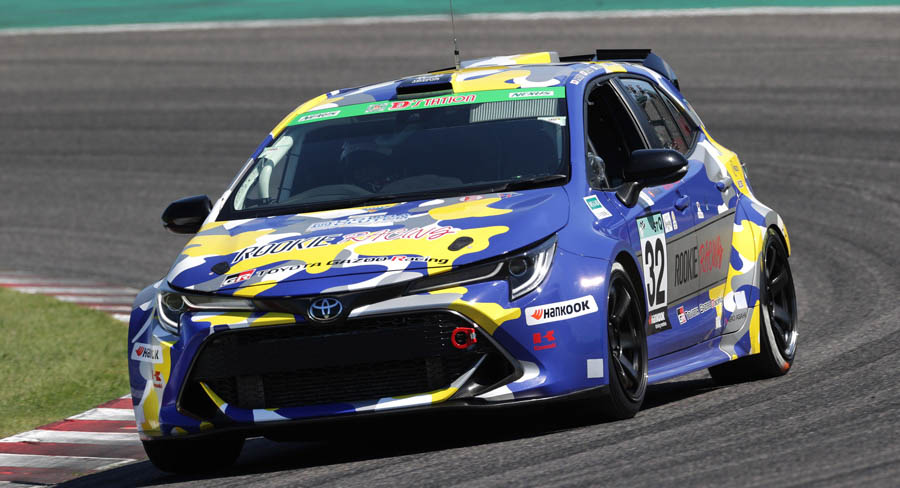
Japanese auto manufacturers Toyota, Subaru, Yamaha, and Mazda, have announced that they will collaborate to further explore alternate fuels for internal combustion engine cars. They will be joined by Yamaha Motor and Kawasaki Heavy Industries.
The vehicle manufacturers made the joint announcement at the Super Taikyu Race in Okayama in Japan, where Toyota chief executive Akio Toyoda is driving a hydrogen-powered race car.
The announcement comes after the Japanese vehicle makers were notably absent from a list of manufacturers who have pledged to phase out the production of fossil fuel vehicles by 2040. The plans, however, are said to be in addition to advancing electrification but they will center on offering customers greater choice while retaining the use of internal combustion engines.
A Three-Pronged Plan
Mazda’s Bio-diesel powered Demio
With an aim to achieve carbon neutrality, the companies announced that they would unite and pursue three initiatives. Firstly, they will participate in races using carbon-neutral fuels, with Mazda revealing that they will be using a 1.5-liter Skyactiv-D engine fueled with next-generation biodiesel in the ST-Q class of the Super Taikyu Race in Okayama. Meanwhile, Toyota and Subaru will also be racing in the same series next year with biomass-derived synthetic fuel powering Subaru BRZ and Toyota GR-86-based race cars.
The second element of the collaboration is to explore the use of hydrogen engines in two-wheeled and other vehicles headed by Kawasaki and Yamaha. Kawasaki has built a world-first liquified hydrogen carrier and is currently conducting verification tests for transporting large-quantity, low-cost hydrogen to Japan produced from Australian lignite. Yamaha, along with Kawasaki, is developing hydrogen-powered engine tech for use in two-wheelers and Yamaha’s four-wheeled recreational vehicles, and Honda and Suzuki will join both companies for further hydrogen two-wheeled vehicle development.
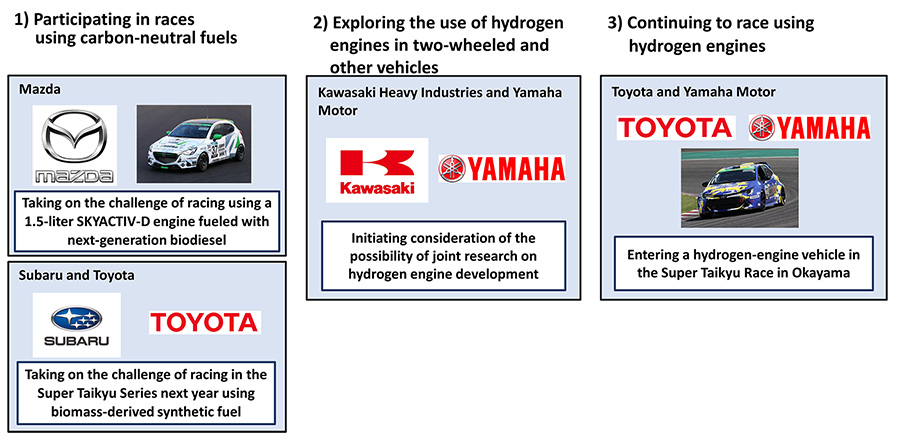
The final aspect highlighted in the announcement is the continued use of hydrogen engines in motorsport. Toyota, Yamaha, and Denso have been working since 2016 to develop a hydrogen engine for this purpose and have entered a vehicle with this under-development engine in three races so far. Toyota plans to compete in the Super Taikyu Race with Toyota President and CEO Akio Toyoda taking stints at the wheel in his “Morizo” driver persona.
The companies also outlined their plans to tackle several other challenges, including transportation, use, and the production of alternate fuels. While Mazda aims to achieve 100 percent electrification by 2030, they are yet to announce an all-out switch to EVs. The same is true of Toyota, which will introduce seven fully electric members to their bZ family but has said that electric vehicles don’t make sense for some regions of the world.
With an aim to achieve carbon neutrality, the companies announced that they would unite and pursue three initiatives. Firstly, they will participate in races using carbon-neutral fuels, with Mazda revealing that they will be using a 1.5-liter Skyactiv-D engine fueled with next-generation biodiesel in the ST-Q class of the Super Taikyu Race in Okayama. Meanwhile, Toyota and Subaru will also be racing in the same series next year with biomass-derived synthetic fuel powering Subaru BRZ and Toyota GR-86-based race cars.
The second element of the collaboration is to explore the use of hydrogen engines in two-wheeled and other vehicles headed by Kawasaki and Yamaha. Kawasaki has built a world-first liquified hydrogen carrier and is currently conducting verification tests for transporting large-quantity, low-cost hydrogen to Japan produced from Australian lignite. Yamaha, along with Kawasaki, is developing hydrogen-powered engine tech for use in two-wheelers and Yamaha’s four-wheeled recreational vehicles, and Honda and Suzuki will join both companies for further hydrogen two-wheeled vehicle development.

The final aspect highlighted in the announcement is the continued use of hydrogen engines in motorsport. Toyota, Yamaha, and Denso have been working since 2016 to develop a hydrogen engine for this purpose and have entered a vehicle with this under-development engine in three races so far. Toyota plans to compete in the Super Taikyu Race with Toyota President and CEO Akio Toyoda taking stints at the wheel in his “Morizo” driver persona.
The companies also outlined their plans to tackle several other challenges, including transportation, use, and the production of alternate fuels. While Mazda aims to achieve 100 percent electrification by 2030, they are yet to announce an all-out switch to EVs. The same is true of Toyota, which will introduce seven fully electric members to their bZ family but has said that electric vehicles don’t make sense for some regions of the world.
Honda and Suzuki are expected to join later.

Nov 16, 2021
By: Janaki Jitchotvisut
Kawasaki’s been hard at work exploring various ways to further carbon neutrality goals for several years. We’ve had cautious glimpses at some of this work on occasion, from a peek at its hydrogen-powered motorcycle to a very recent glimpse under the fairings of its battery electric bike. Still, there comes a time when it’s better to have friends to back you up.
That’s why, on November 13, 2021, Kawasaki Heavy Industries, Subaru, Toyota, Mazda, and Yamaha jointly announced their plans to cooperate in order to reach their carbon neutrality goals. Some of it will involve electrification, but this collective group believes that it can still make internal combustion engines work by simply using more carbon neutral fuels. Is it greenwashing, or is there something more to it?
In a perfect world, of course, this wouldn’t be an issue. In a slightly less-perfect world, production of green hydrogen is theoretically possible, but an awful lot of steps have to be taken to keep it truly neutral. From harnessing wind energy to create the hydrogen, to transporting the hydrogen for use using truly carbon-neutral transportation methods, forging that chain involves many careful links. Will it actually work that way? We certainly hope so, but it's all speculation at this point.
Previously:

Kawasaki Discusses Its Plans For The Future
Anyway, back to the prongs of this massive multi-company agreement that are motorcycle-related. While Mazda, Subaru, Toyota, and Yamaha are all engaged at various levels in developing hydrogen racing engines for four-wheeled vehicles, Kawasaki and Yamaha are currently considering embarking on joint hydrogen engine research for motorcycles. Since both companies have already been exploring this arena independently, it makes sense that they’d want to compare and contrast what they’ve learned, and perhaps truly put their heads together regarding what’s working and what isn’t.
While it’s currently only Kawasaki and Yamaha that have announced these plans to work together on hydrogen motorcycle engine development, they also add the following two lines of intrigue in their joint press release:
Anyway, back to the prongs of this massive multi-company agreement that are motorcycle-related. While Mazda, Subaru, Toyota, and Yamaha are all engaged at various levels in developing hydrogen racing engines for four-wheeled vehicles, Kawasaki and Yamaha are currently considering embarking on joint hydrogen engine research for motorcycles. Since both companies have already been exploring this arena independently, it makes sense that they’d want to compare and contrast what they’ve learned, and perhaps truly put their heads together regarding what’s working and what isn’t.
While it’s currently only Kawasaki and Yamaha that have announced these plans to work together on hydrogen motorcycle engine development, they also add the following two lines of intrigue in their joint press release:
Going forward, they are planned to be joined by Honda Motor Co., Ltd. and Suzuki Motor Corporation, and the four companies intend to jointly explore the possibility of achieving carbon neutrality through the use of internal combustion engines in two-wheeled vehicles. To maintain a distinct line between cooperation and competition, they intend to proceed after establishing a framework that will clearly define areas of cooperation and collaborative research.
We don’t know what the future holds, but it will certainly be interesting to see.
Toyota, Subaru and Mazda to develop new combustion technology
Japanese car firms – alongside Yamaha and Kawasaki – turn to hydrogen and biofuel for use in traditional engines
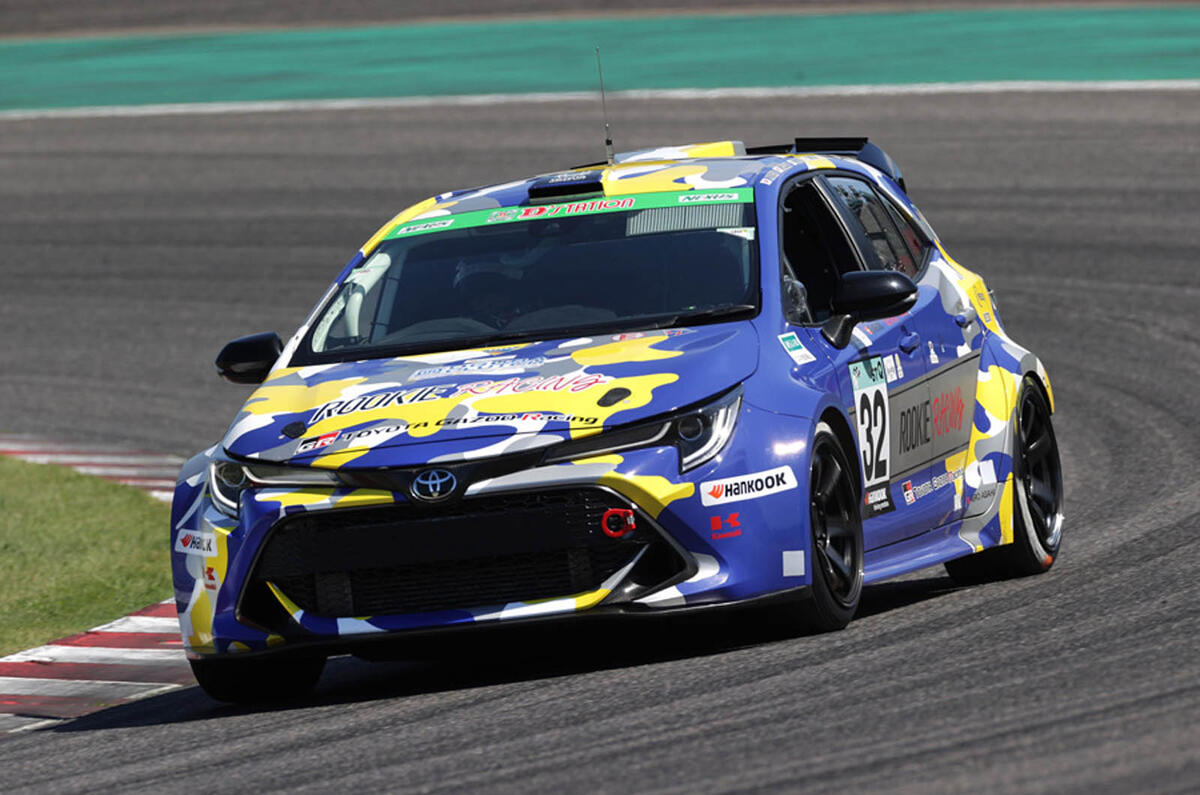
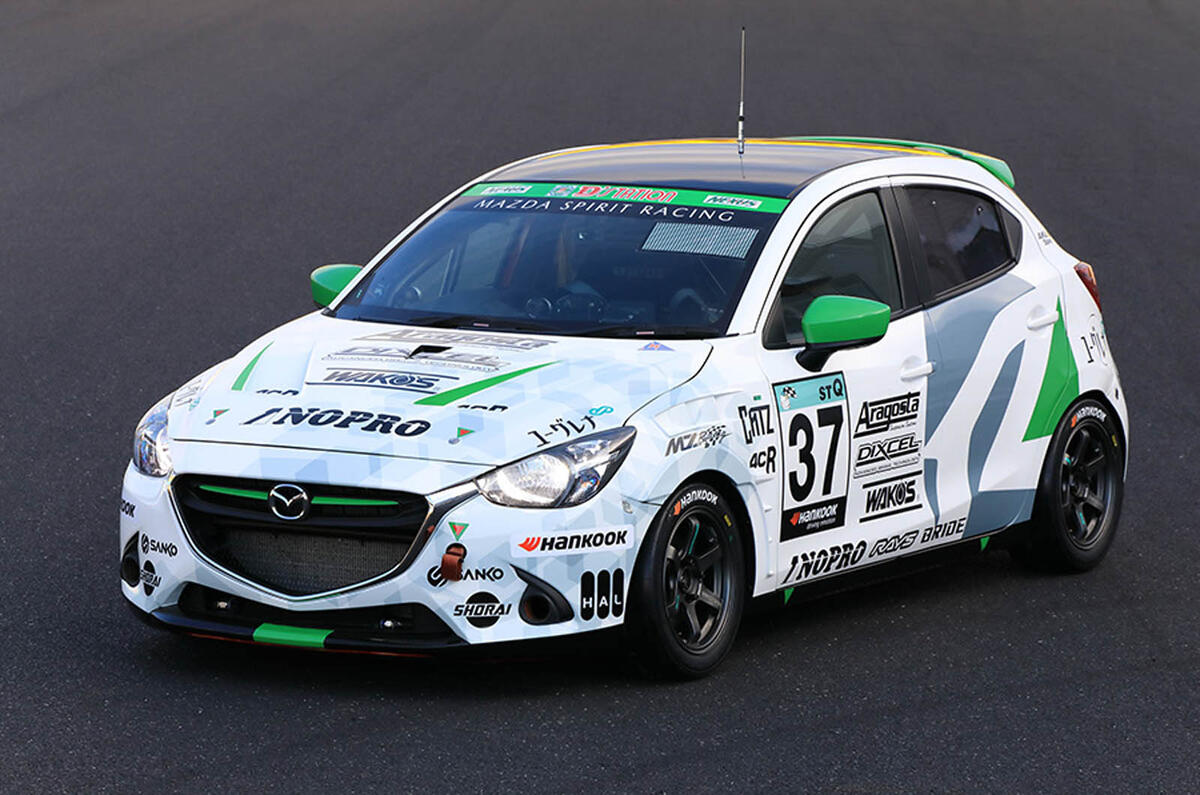
NEWS
by Felix Page
17 November 2021
Five of Japan's largest vehicle manufacturers - Subaru, Toyota, Mazda, Kawasaki and Yamaha - have jointly detailed a plan to safeguard the future of the internal combustion engine.
Speaking together at the Super Taikyu Race in Okayama earlier this week, representatives from each of the firms vowed to collaborate on "expanding fuel options" using existing ICE technology, bucking a wider industry trend towards full electrification.
The companies "intend to unite and pursue the three initiatives of participating in races using carbon-neutral fuels; exploring the use of hydrogen engines in two-wheeled and other vehicles; and continuing to race using hydrogen engines."
They plan to continue on a trajectory towards collective carbon neutrality, as part of which they will continue to invest in electrification. But they will also seek to collaborate "in producing, transporting and using fuel in combination with internal combustion engines", as part of a drive to give customers greater choice.
Toyota's efforts in this area, particularly, are well documented. The company is already using a lightly modified Corolla race car to determine the viability of hydrogen-combustion technology, which, it says, would reduce the emissions of its vehicles without disregarding the several decades it has invested in developing its existing petrol and diesel engines.
Now, as part of this new joint initiative, Toyota will expand its existing partnership with Subaru to test 'carbon-neutral' synthetic fuels in a race environment. Next year, Subaru and Toyota will enter a BRZ and GR 86, respectively, into Japan's Super Taikyu race series (in which the hydrogen-combustion Corolla currently races) using synthetic fuel derived from biomass.
The two car makers already have an EV development partnership in place and recently revealed their respective debut EVs: the technically identical Toyota bZ4X and Subaru Solterra. This latest element of the collaboration will see them attempt to "accelerate the development of technologies for all options and take on the challenge of achieving carbon neutrality."
Their synthetically fuelled entries will be joined on the grid in 2022 by an experimental racer from Mazda, based on its 2 supermini. Using a specially adapted version of the firm's 1.5-litre Skyactiv-D diesel engine, it runs on biodiesel derived entirely from biomass.
Mazda will use the race series to test and improve the reliability of its biodiesel-fuelled engine with a view to encouraging "the expansion of the use of next-generation biodiesel fuel". The fuel itself is made from cooking oil and fats, which, Mazda said, means it does not compete with the human food supply. Notably, it does not require any modification to the standard engine, nor require any bespoke infrastructure to be implemented.
Japanese car firms – alongside Yamaha and Kawasaki – turn to hydrogen and biofuel for use in traditional engines


NEWS
by Felix Page
17 November 2021
Five of Japan's largest vehicle manufacturers - Subaru, Toyota, Mazda, Kawasaki and Yamaha - have jointly detailed a plan to safeguard the future of the internal combustion engine.
Speaking together at the Super Taikyu Race in Okayama earlier this week, representatives from each of the firms vowed to collaborate on "expanding fuel options" using existing ICE technology, bucking a wider industry trend towards full electrification.
The companies "intend to unite and pursue the three initiatives of participating in races using carbon-neutral fuels; exploring the use of hydrogen engines in two-wheeled and other vehicles; and continuing to race using hydrogen engines."
They plan to continue on a trajectory towards collective carbon neutrality, as part of which they will continue to invest in electrification. But they will also seek to collaborate "in producing, transporting and using fuel in combination with internal combustion engines", as part of a drive to give customers greater choice.
Toyota's efforts in this area, particularly, are well documented. The company is already using a lightly modified Corolla race car to determine the viability of hydrogen-combustion technology, which, it says, would reduce the emissions of its vehicles without disregarding the several decades it has invested in developing its existing petrol and diesel engines.
Now, as part of this new joint initiative, Toyota will expand its existing partnership with Subaru to test 'carbon-neutral' synthetic fuels in a race environment. Next year, Subaru and Toyota will enter a BRZ and GR 86, respectively, into Japan's Super Taikyu race series (in which the hydrogen-combustion Corolla currently races) using synthetic fuel derived from biomass.
The two car makers already have an EV development partnership in place and recently revealed their respective debut EVs: the technically identical Toyota bZ4X and Subaru Solterra. This latest element of the collaboration will see them attempt to "accelerate the development of technologies for all options and take on the challenge of achieving carbon neutrality."
Their synthetically fuelled entries will be joined on the grid in 2022 by an experimental racer from Mazda, based on its 2 supermini. Using a specially adapted version of the firm's 1.5-litre Skyactiv-D diesel engine, it runs on biodiesel derived entirely from biomass.
Mazda will use the race series to test and improve the reliability of its biodiesel-fuelled engine with a view to encouraging "the expansion of the use of next-generation biodiesel fuel". The fuel itself is made from cooking oil and fats, which, Mazda said, means it does not compete with the human food supply. Notably, it does not require any modification to the standard engine, nor require any bespoke infrastructure to be implemented.
The firm is already using biodiesel in some of its company cars, having determined that its performance is on a par with that of standard, petroleum-based diesel.
Kawasaki and Yamaha, meanwhile, have teamed up to develop a hydrogen engine for motorbikes, an initiative it plans for Honda and Suzuki to join in the future. The four companies will explore how hydrogen-combustion motors can help to achieve carbon neutrality but will "maintain a distinct line between cooperation and competition" by establishing categorically which areas of research will be carried out jointly, and which are the preserve of each independent marque.
Kawasaki and Yamaha, meanwhile, have teamed up to develop a hydrogen engine for motorbikes, an initiative it plans for Honda and Suzuki to join in the future. The four companies will explore how hydrogen-combustion motors can help to achieve carbon neutrality but will "maintain a distinct line between cooperation and competition" by establishing categorically which areas of research will be carried out jointly, and which are the preserve of each independent marque.


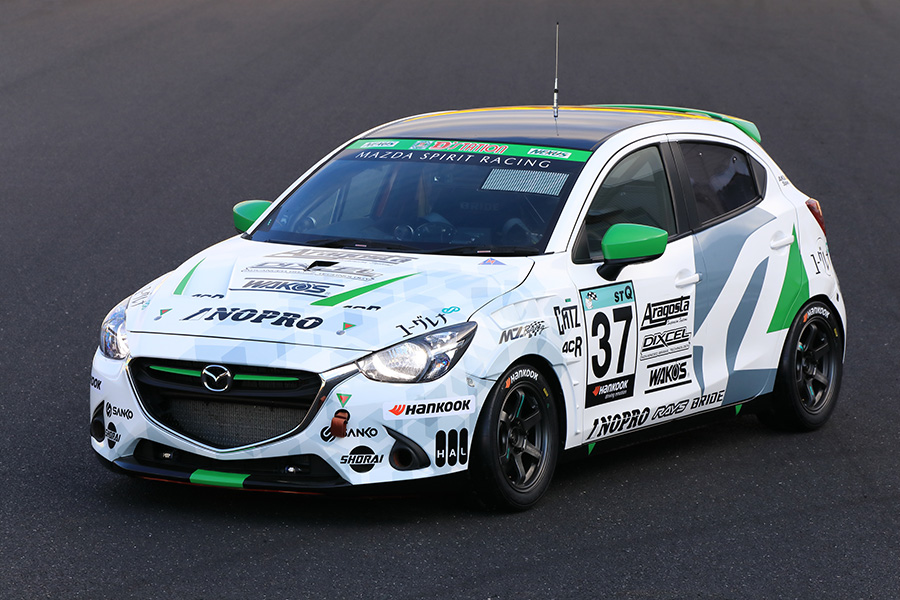




No comments:
Post a Comment